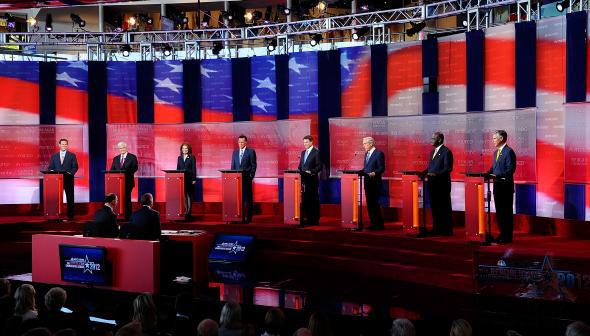The ever-growing number of Republicans dreaming of winning the White House now know the first bar they’ll need to clear if they’re going to make it there. Fox News, which will host the first GOP presidential debate in Cleveland on Aug. 6, has decided to cap the number of candidates onstage at 10, according to the Washington Post:
The criteria set by Fox News is similar to the standards it has set for past debates. To qualify for the event, candidates must place in the top 10 of an average of the five most recent national polls by August 4th at 5 p.m. ET. Such polling must be conducted by major, nationally recognized organizations that use standard methodological techniques and recognized by Fox News.
Debate participants must also meet all U.S. constitutional requirements to run for president, must have announced their campaign and filed the necessary paperwork with the Federal Election Commission and must have paid all required federal and state filing fees.
As I explained earlier this week, figuring out how to winnow a field that could be 20-strong by the time the first debate rolls around had become a serious problem for the Republican National Committee. Party officials want enough candidates on stage to highlight the relative depth and diversity of the field, but they also can’t let everyone on stage and risk having the candidates’ opening statements be made to be followed immediately by their closing ones. The situation became so fraught that the RNC scrambled to publicly pass much of the responsibility for the decision onto the network that will televise each debate. “Ultimately, it’s the networks’ decision,” RNC spokesman Sean Spicer said over the weekend. “There’s an obligation for the party to make sure the standard is fair. But it’s not our decision.”
Fox News, it seems, was more than willing to make the call for them.
Candidates who don’t make the Fox News cut could still be invited to the other RNC-sanctioned debates, but anyone who misses out on an invite to Cleveland will lose a golden opportunity in front of a national audience. If a candidate misses out on that, it will become even more difficult to make the case that he or she should be invited to the second debate the following month. That debate will be televised by CNN, which has the right to set its own rules.
A lot can change between now and the Fox News-imposed polling cutoff—particularly as the not-yet-official candidates enjoy their own post-announcement bumps—but based on the current RealClearPolling average, the top seven likely candidates have some breathing room: Jeb Bush (15.4 percent), Scott Walker (13.2 percent), Marco Rubio (13.2 percent), Rand Paul (9.2 percent), Mike Huckabee (8.6 percent), Ted Cruz (8.6 percent), and Ben Carson (7.8 percent).*
Chris Christie currently sits in eighth place (5.4 percent), followed by Rick Perry (2.4 percent) and Rick Santorum (2.3 percent). Currently on the outside looking in are: John Kasich (2 percent), Carly Fiorina (1.3 percent), Bobby Jindal (1.3 percent) and Lindsey Graham (1.3 percent).
A potential spoiler—and I hate to even say his name—is Donald Trump, who continues to make noise about actually launching a campaign. While The Donald is never going to seriously compete for the GOP nomination, if he does actually launch an official campaign it’s not unthinkable that he could find himself in the top ten heading into the Fox News debate. Because the network decided against including other factors—like campaign infrastructure or small-dollar fundraising—Trump could cause trouble for the field by simply filing his FEC paperwork.
Most pollsters tend to leave the reality TV star out of their surveys all together, but his name recognition alone normally means he beats out at least a few serious candidates when he’s listed as an option. In a Monmouth University poll just last month, for instance, Trump topped Rubio, Paul, Christie and Perry. The vast majority of the GOP electorate may have ruled out voting for Trump—and it appears they indeed have—but in a crowded field, his name recognition alone could earn him the 3 percent he’d currently need to find himself onstage. Trump displacing a legitimate candidate from the first debate would be an embarrassment for Republicans. Fittingly, though, it would also make for must-see TV.
*Correction, Thursday, May 21: This post orignally misstated Rand Paul’s name as Paul Rand.
